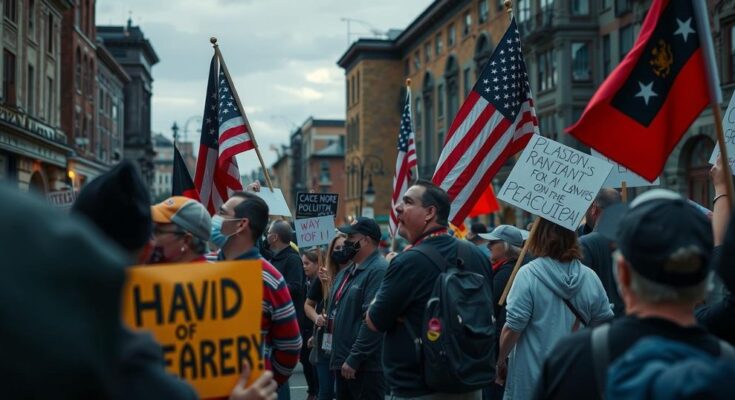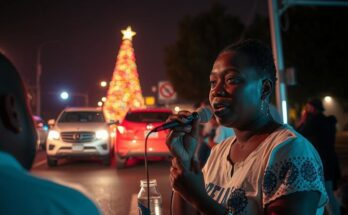Latino residents in Allentown, Pennsylvania, protested Donald Trump outside his campaign rally, reacting to derogatory remarks made by a comedian about Puerto Rico. The protest emphasized the influence of Puerto Rican voters in swing states as they express heightened discontent towards the former President, specifically in light of the upcoming election.
On Tuesday, October 29, in the primarily Hispanic city of Allentown, Pennsylvania, a group of approximately 50 passionate protesters voiced their dissent outside a Donald Trump campaign rally. Their chants, including “Immigrants make America great!”—a direct counter to Trump’s slogan—echoed the frustrations of many Latino citizens, particularly Puerto Ricans, following derogatory remarks made by a comedian at a previous rally. The sentiment among the protesters was one of disgust and defiance, as exemplified by Ivet Figueroa, a local clerk raised by Puerto Rican parents, who expressed her outrage: “We are citizens, and he’s referring to us that way? How dare him!” The controversy stems from comments made by comedian Tony Hinchcliffe, who described Puerto Rico as “a floating island of garbage” during a Trump rally at Madison Square Garden, inciting anger among Puerto Ricans living in the mainland United States. This demographic, particularly influential in battleground states like Pennsylvania, is pivotal as the upcoming election approaches. With over 400,000 Puerto Ricans residing in Pennsylvania alone, their votes could significantly impact the outcome of the election between Trump and Democratic candidate Kamala Harris, who is attempting to close the gap in this key state. Despite some protesters feeling disillusioned about their level of participation due to road closures and the weekday timing, the protest underscored the growing dissent among Latino voters toward Trump. Organizers have reported instances of voters changing their political allegiance in response to the remarks. Armando Jimenez, a deputy organizing director for Make the Road Action Pennsylvania, noted, “We have heard people actually changing their minds, who are Republicans and now because of this are going to vote for Kamala.” Conversely, some Trump supporters, such as Michelle Fernandez, maintained their loyalty despite the controversy, emphasizing that the comedian’s remarks do not influence their voting choice. Fernandez stated, “The comment was ugly, but the comment is not the deciding choice for me,” redirecting her focus towards issues such as immigration, crime, and the economy rather than social commentary. In a scene underscored by heightened political tensions, Allentown’s current mayor, Matthew Tuerk, joined protesters expressing their disdain for the comments made regarding Puerto Ricans, while others, including an isolated demonstrator with a sign reading “Make Racism Shameful Again,” signified the broader conversation about race and identity in America as Election Day nears. The protesters made their feelings clear—”Nov 5 is trash day. Let’s put you where you belong,” read one sign, encapsulating the urgency with which they wish their voices to be heard in this critical electoral period.
The article reports on a protest occurring in Allentown, Pennsylvania, where Latino residents, particularly those of Puerto Rican descent, expressed their outrage at comments made by a comedian during a Donald Trump rally. This incident highlights the increasing political mobilization among Latino voters as they respond to perceived slights against their identity and community. The importance of the Latino vote, particularly in battleground states such as Pennsylvania, is crucial in the upcoming US Presidential election, as the election is poised to be closely contested and a shift in voter sentiment could sway the results significantly. The protesters’ responses reflect broader trends in electoral politics and the sensitivities surrounding immigration and representation.
In conclusion, the protest in Allentown serves as a microcosm of the broader discontent among Latino voters towards the Trump administration, particularly in light of offensive remarks made about Puerto Rico. As Election Day approaches, the engagement of this demographic could prove pivotal in determining the outcome of the election, especially in a critical state like Pennsylvania. The sentiment expressed by both supporters and opponents of Trump underscores the complex dynamics of identity politics as voters mobilize in response to their experiences and concerns. The controversy surrounding Hinchcliffe’s comments has not only galvanized voters but also stirred dialogue surrounding race and representation in America.
Original Source: www.lemonde.fr




